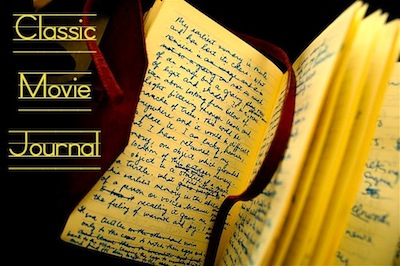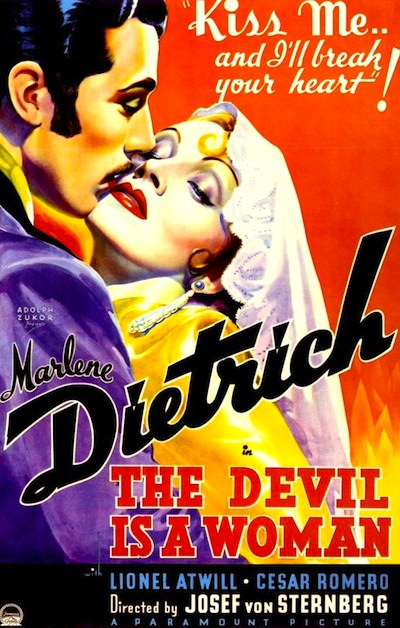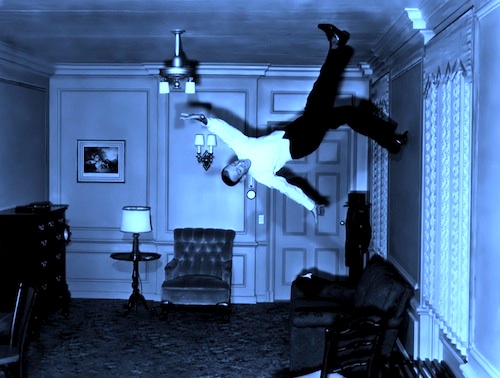By Jennifer Baldwin. From my earliest days as an old movie obsessive (circa, age fourteen), I’ve been obsessed with finding out how young people fall in love with old movies.
For my grandma’s generation, the love is easy to explain: These aren’t “old movies,” these are just THE movies, the ones they spent their lives seeing in the theaters.
For my mom’s generation, these old movies weren’t exactly contemporaries, but they weren’t so old and distant either. When my mom was a kid in the 1960s, the old movie stars were still around and the old movies must have still felt familiar, if a bit musty. It’s a lot like my own generation’s relationship to the movies of the 1980s. My Saturdays were filled with a never-ending supply of popular ‘80s movies on cable TV, just as my mom’s youth was filled with Rita Bell and “Bill Kennedy at the Movies.”
 But how do people born in the ‘70s, ‘80s, and ‘90s become old movie buffs? How do Generations X, Y, and Z get into watching movies made in the ‘20s, ‘30s, and ‘40s?
But how do people born in the ‘70s, ‘80s, and ‘90s become old movie buffs? How do Generations X, Y, and Z get into watching movies made in the ‘20s, ‘30s, and ‘40s?
I know how my own old-movie odyssey went, all of the influences and the inspirations. I know I owe a lot to the years 1988 to 1992, when it seemed like every summer another movie came out that was set in a 1940s Never Land – whether it was Who Framed Roger Rabbit? or The Rocketeer or A League of Their Own – and each of these new movies whetted my imagination for the old ones.
I know I owe a lot to my grandparents and their love of jazz, and how that love was transferred to me, so that for three solid years I spent my summers at the Elkhart jazz festival and never at a New Kids on the Block concert. Being a fan of swing jazz and Dixieland made it easier to love other old things, like movies.
I know I owe a lot to my grandmother and my mom, who invited me to watch these strange old movies with them, folding laundry on the couch and falling in love with Cary Grant and Clark Gable, thus beginning my own long, intoxicating affair with old Hollywood.
But how do other people of my age and generation get into the old stuff? What are their paths to classic cinema ecstasy?
I have a feeling that no matter our divergent and differing paths, we have one thing in common: Turner Classic Movies.
Where would I be without TCM? (And the late, lamented American Movie Classics. The channel now calling itself AMC is nothing like it’s once glorious predecessor.) Sure, I had a VCR and a Blockbuster card, but it’s hard to make any real discoveries at the video store. Too much fluorescent light and too little to find in the “Classics” section. It wasn’t enough to feed my growing addiction.

TCM made it possible to be a fanatic. It gave me an endless supply of classics and rarities, a readily available buffet of movies from the silents to the Sixties. It was my classic movie classroom and I was an A+ student. TCM allowed for discoveries, for stumbling upon an unknown movie on a random Tuesday morning that would – two hours later – stir my heart to the core and change my life. You think I’m exaggerating, but that’s how much old movies mean to me.
At the video store, I would have to choose the movie, but in watching TCM, I could let the movies choose me. TCM came on the air in 1994. I first started getting into old movies as a young teen in 1995. Is it any coincidence that only a few years later I would be a fanatic, a veritable old movie junkie, a Preston Sturges wannabe ready to defend Doris Day or Frank Capra at a moment’s notice in my undergrad film classes?
TCM – as weird as this is to say about a TV channel – was a place where I felt at home, a place where I felt I belonged. I was a weird kid who cared more about Bogey and Cagney than about Brad Pitt or Keanu Reeves. TCM felt like home. I still feel that sense of belonging all these years later.
TCM makes these old movies seem fresh, vibrant, alive. It’s all about the little touches: the bumpers and promos; the Star of the Month retrospectives; the monthly themes; the birthday tributes; the In Memoriam videos; the shorts and cartoons between films; the little featurettes like “What a Character” and “Word of Mouth.” TCM has basically created a 21st century old movie “culture,” influencing and shaping the conversation about old movies for the past seventeen years.
Starting on April 28, TCM will be hosting its 2nd annual Classic Film Festival, and I’ll be there. It’s almost too much for me to put into words what this means to me. If these past few days of Holy Week were the high holy days of my spiritual religion, then these next four days of April are the high holy days of my movie religion.
I already have my schedule planned to the minute. I’ve got my movies all lined up: rarities like The Constant Nymph, The Devil is a Woman, Went the Day Well?, and Hoop-La; favorite classics like An American in Paris, Royal Wedding, Dodsworth, The Cameraman, Gaslight, and Fantasia; and oddities like The Tingler (at midnight!), The Sid Saga, and Walt Disney’s Laugh-O-Grams, as well as much, much more. I’ve got a full schedule (and if I make it through, I’ll die a happy woman!).

In my real life, I’ve only ever known a few people I can talk to about old movies. On the internet, it’s much easier of course, thanks to all of the great, friendly bloggers who share my passion. But as wonderful and life-saving as the internet classic movie community may be, it’s still not a perfect substitute for being in the same room or sitting in the same theater with real life, flesh-and-blood old movie fans. On Thursday, when I get to the Hollywood Roosevelt Hotel, I will finally be face-to-face with a whole host of my fellow old movie fanatics, all of us brought together by our love of classic film and our devotion to Turner Classic Movies.
I will also be blogging the festival for Libertas, writing reviews and articles on the films and events at the festival. I’ll be taking along my camera, so look for a copious amount of pictures from the festival as well. I’ve even decided to start a Twitter account to give quick updates on what I’m up to each day.
But beyond the glitz of the festival and the thrill of seeing these movies on the big screen, I’ll quietly be on the lookout for other young people like me – twentysomethings and thirtysomethings – kids who somehow inexplicably fell in love with old movies, and in the quiet lull between film screenings, I’ll sidle up to them and ask: How did you get into old movies? Whatever their various and fascinating stories, I’m sure three letters will be on everyone’s lips: TCM.
Posted on April 26th, 2011 at 11:35am.

Great article, Jennifer. It’s a very interesting topic, and it’s nice to read about someone’s journey into film.
I was born in the ’70s, and I can say that my venture into film was birthed from a love of all things Star Wars. When I was a kid, I read all I could about the space opera, and naturally that pointed me into the direction of everything by John Ford and Akira Kurosawa, to Gone With the Wind, Metropolis, and David Lean’s work.
A pursuit of all things George Lucas led me to Francis Ford Coppola, Steven Spielberg, and Brian DePalma. Then in high school, I went through my Martin Scorsese phase, which is where I discovered that his most interesting and rewarding work came in his film studies, not so much his own features.
One day, I stumbled upon a Scorsese documentary about the European New Wave. I have never seen anything like Umberto D, The Bicycle Thief, 400 Blows, or Breathless — it was a revelation.
My latest phase was Stanley Kubrick, which I don’t think I’ve escaped. In another documentary, Scorsese said filmmakers are all sons and daughters of Cecil B. Demille and DW Griffith, and that Kubrick is the father of modern cinema.
I have yet to be able to dispute that.
Vince, wonderful comment! I agree almost completely with your assessment of Scorsese. His Personal Journey Through American Movies was central to my classic movie education, but I find I run hot and cold on his actual films.
It’s interesting that you pursued the work of specific directors. I didn’t really start focusing on directors until I got to college; in my teenage years it was all about the old movie stars.
They actually cared about writing good stories.
On a related note, I saw Human Desire the other day. I really enjoyed it, especially being able to read your explanation about how the scenes were set up to communicate the story. That’s a way of thinking that I’m not used to. I find it fascinating, and I love learning more about it. That kind of subtle storytelling seems to be a lost art, unfortunately.
Lovely post! Lovers of old movies are driven by a loathing of modern film and modern culture, whether they know it or not. For me, there was also an element of teenage crush proneness. Audrey Hepburn, Katherine Hepburn, Cyd Charisse, Grace Kelly — how could the TV-nurtured airheads of the 80s and 90s, sweaty from their endless aerobic workouts, compete with these charming and sophisticated women? How could a mopish Molly Ringwald and vacuously vampish Sharon Stone seem anything but nonentities next to the over-brimming personalities of Rosalind Russell in His Girl Friday and Barbara Stanwyk in Ball of Fire? The European starlets were only fuel to the fire: Anouk Aimee, Anna Karina, etc.
To be blunt: modern Hollywood firm is, for me, then as now, completely without erotic allure.
“Modern Hollywood firm” should be “film”!
Got it …